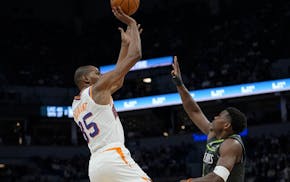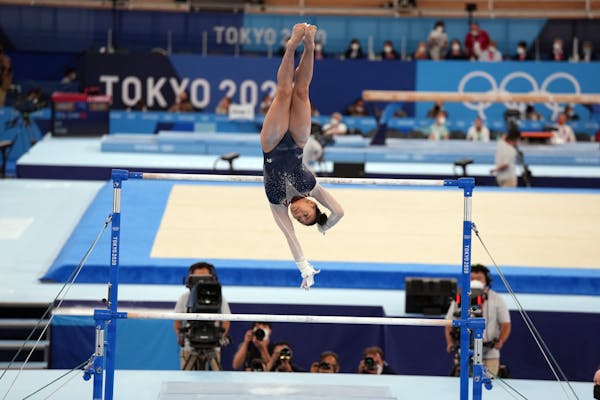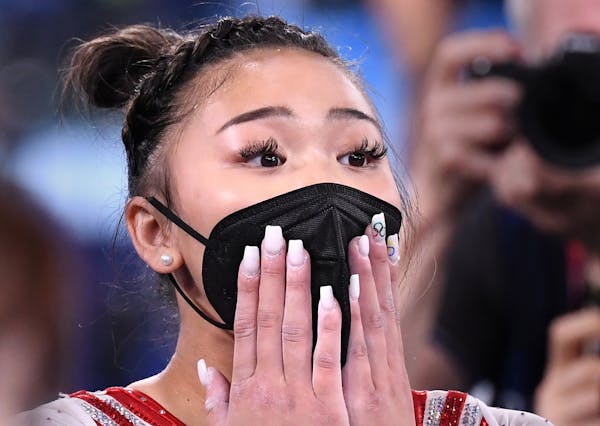TOKYO — She smiled wryly after her vault, as if she knew a secret.
She clapped, once, after her floor exercise, as if she knew what she had done.
Moments later, Suni Lee of St. Paul, an 18-year-old born to immigrant parents, became the best story in America, one of the best stories Minnesota has ever been able to claim.
Her Hmong family insisted on seeing the United States as the land of hope and dreams.
But who dares to dream this big?
"My Dad said do what I normally do, and go out and do my best,'' Lee said. "He said not to focus on the score because in their heart I was already a winner.''
Days ago, Lee wasn't even the best gymnast on her team. Thursday, she earned the title of best gymnast in the world and entered the pantheon of Minnesota's greatest athletes, winning the all-around title at the Tokyo Olympics.
Suni Lee may be the best story Minnesotans have seen since Lindsey Vonn graduated from the bunny slopes of Buck Hill to gold in Whistler, or Lindsay Whalen dribbled from her school gym in Hutchinson to gold in London.
Suni's story might be even better.
Lee flying across the floor at the Ariake Gymnastics Center and sticking her landings is Kirby Puckett hitting that Game 6 home run and Jack Morris telling Tom Kelly he's not coming out of Game 7. Only the degree of difficulty was higher.
Lee had to do it alone.
At 18.
On aching legs.
With the eyes of the world, not just Americans watching the World Series, upon her.
In the wake of Simone Biles, her teammate, withdrawing from her Olympics because when Biles took flight she didn't know where she would land.
"It doesn't even feel like real life,'' Lee said.
Lee and Biles proved this week that there are different forms of athletic bravery. Biles dared to protect herself while inviting the rage of a million cro-magnons. Suni Lee honored the queen by becoming the queen.
Some kids get an envelope of cash when they graduate from high school. Lee opted for gold.
Despite a lack of modern-day team championships from everyone other than Puckett's Twins and Whalen's Lynx, Minnesota has produced individual greatness, often from the crooked streets of St. Paul.
Dave Winfield, Paul Molitor, Matt Birk and Morris grew up on St. Paul's sandlots and won professional championships, none of which shocked.
The best sports stories are often the least probable, and Lee on Thursday night in Tokyo became the surprise star of these Olympics, the story that will be told on "The Today Show" and for a thousand Minnesota tomorrows.
"There was a time when I wanted to quit,'' she said.
COVID protocols took a toll, she said. Her father's accident left him paralyzed in 2019. She was the youngest member of a team facing intense expectations, a team that won silver instead of gold in the team competition as Biles withdrew.
"I just kind of had to switch gears, because we were coming in to compete for second place,'' Lee said. "When the opportunity was there I knew I had to do what I normally do. This whole season, I've been second to her. If I got into my head I would do really bad. But I stayed focused throughout the whole thing.''
Third up was the balance beam, and she had to wait. And wait. She paced, and pantomimed her routine on the floor. Over. And over. And over. Her left hand went to her stomach, then her right, as if she had butterflies, or pain. A cameraman rushed over, red light glowing, and blocked her view.
Her hand went back to her stomach. She bent over, hands on knees. Her coach, Jess Graba, tried to calm her. She ascended the stairs, and again waited, and then slipped on her first spin.
She gathered herself, grew stronger, flew off the beam and stuck another dismount. As she prepared to walk to the floor exercise, she mugged for friends in the stands.
"Without that much pain, there's not that much pleasure,'' Graba said.
They are a Minnesota team. They met when she was 6, on her first trip to his gym, and she started bouncing around, "doing crazy stuff,'' and he gave the first of a dozen gym-floor promotions.
She has fought through leg injuries and anxieties that caused Graba to shorten her floor routine, creating a version she had never practiced.
"She's smart," Graba said. "She's adaptable. I'm so glad everyone else got to see that.''
Everyone saw a Hmong girl from an immigrant family create an improbable version of the American dream. The best version of the American dream.
In one night, Sunisa Lee of St. Paul became the best in the world, one of the best stories we will ever get to clap our trembling hands for. And one day she will understand that, but Thursday she was a teenager taking selfies with her lavender-cased phone of her new gold jewelry, and laughing with her friends.

Souhan: Anxiety and depression in the NFL helped inspire Lindsey Young's children's book
Souhan: For Lynx star Napheesa Collier, 'Phee' is just fine

Souhan: Will the Wolves trade for Kevin Durant? Should they?

Souhan: If Edwards is a franchise player, he needs to act and play like it



